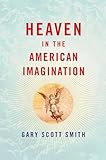In Heaven in the American Imagination (Oxford University Press), Gary Scott Smith surveys the vast landscape of religion in the United States, showing how changing historical circumstances have influenced ideas and portraits of heaven. From traditional Christian theology and sermons on hell’s eternal torments, to popular culture, near-death experiences, and New Age perspectives, Smith highlights important currents of reflection on the afterlife. His research, which draws upon sources ranging from art and literature to music and cinema, should appeal to a variety of readers. And while his overviews simplify complex matters of theology, the end result is nonetheless valuable, scholarly, and deeply informed.
Smith focuses primarily on Protestant and evangelical conceptions of heaven. Beginning with a detailed study of Puritan beliefs, he analyzes the impact of Jonathan Edwards, George White-field, and the Great Awakenings. Early evangelicals associated heaven with splendorous beauty, the grandeur of God, and the astounding eternal love the saints would share with their Lord. Nineteenth-century slaves, on the other hand, anticipated heavenly rewards of freedom, justice, and compensation for suffering. Before the Civil War, descriptions of heaven stressed themes of domesticity, family reunion, and leisure. Later, during the Gilded Age, heavenly visions tended toward pictures of ongoing personal growth, work, and service.
Unitarians, deists, freethinkers, Mormons, and Social Gospelers offered their own very different portrayals of heaven. More recently, in an era marked by greater religious plurality, thinking on heaven has evolved significantly, as Smith amply demonstrates in a chapter revealingly titled, “Heaven in a Postmodern, Anxiety-ridden, Entertainment-oriented, Therapeutic, Happiness-based Culture.” Yet Smith explains that the New Atheist movement has neither weakened confidence in heaven’s existence nor altered the substance of believers’ expectations.
Smith insists that American visions of heaven have always accentuated and reflected the dominant societal trends of the age, as well as the hopes and expectations people have about ultimate human fulfillment. Still, despite such variations, he concludes that Christians have remained remarkably consistent in maintaining that heaven will be more beautiful, enjoyable, and spectacular than anyone can imagine.
As for who can enter heaven, and how, passionate debates persist between different branches of Christendom. While Catholics and Protestants both affirm the need for grace, they continue to disagree about the existence of purgatory and the relationship between faith and good works. Within the Protestant fold, Calvinists and Arminians debate the nature of salvation, wrestling over the interplay between God’s sovereignty and human free will.
Smith contends, however, that last century’s dominant theological controversy pitted traditional, conservative views of heaven against liberal challenges. Is heaven an otherworldly paradise into whose comforts one gains admission through faith in Jesus Christ? Or is heaven a matter of achieving justice here and now, of “bringing heaven to earth” through political and social reforms?
Advocates of feminist, Latin American, and black liberation theologies have more or less adopted the latter perspective. But Smith, in closing, offers a partial defense of the older view. Even if concentrating on heaven sometimes leads to apathy, many of those who keep the afterlife firmly in sight not only strive after personal holiness, but also work diligently to better our world.
Bill Walker is a doctoral student in philosophy of religion and theology at Claremont Graduate University.
Copyright © 2011 Christianity Today. Click for reprint information.
Related Elsewhere:
Previous Christianity Today articles on heaven include:
Heaven, Hell, and Rob Bell: Putting the Pastor in Context | He’s not the first to try to resolve old biblical tensions in new ways. (March 2, 2011)
Dwelling in Heaven’s Suburbs | Creating a culture of resurrection is key to full-orbed ministry. (September 28, 2010)
How the Early Church Saw Heaven | The first Christians had very specific ideas about who they would meet in the afterlife. (August 8, 2008)
Heaven is not our Home | The bodily resurrection is the good news of the gospel—and thus our social and political mandate. (March 24, 2008)
The Hope of Heaven | Have Christians forfeited their rightful anticipation of eternity? (June 1, 2003)
CT has more music, movies, books, and other media reviews.










